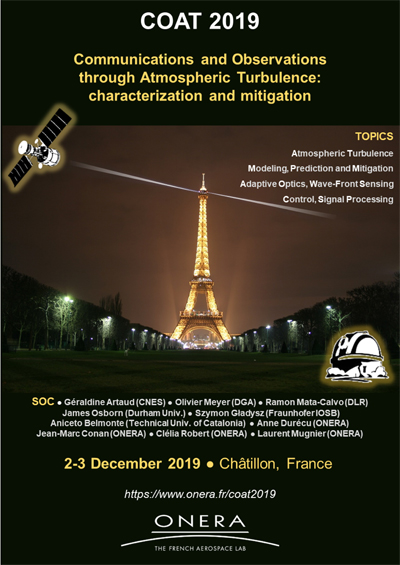COAT-2019 - workshop
ONERA, Châtillon
Communications and Observations through Atmospheric Turbulence: characterization and mitigation
Launch of the associated call for paper.
Planned sessions
- Atmospheric turbulence: modeling, characterization & prediction
- Impact of turbulence on beam propagation
- Adaptive optics for space observation
- Novel turbulence mitigation strategies
- Ground-space optical links: concepts and applications
- Free space communication links: experimental demonstrations
Scope
 In a large variety of fields, the development of ever more demanding optical systems now requires a thorough understanding of the impact of atmospheric turbulence together with the development of dedicated mitigation strategies. Originally driven by astronomy, these issues now concern near ground imaging, satellite observation, ground-space and near ground optical telecommunications and frequency dissemination, laser focusing... The workshop aims at giving an overview of current research activities in this field. It will address turbulence impact and mitigation, especially when facing strong turbulence, strong scintillation, high apparent wind speeds induced by target tracking, anisoplanatism effects due to the field of view or point-ahead angle...
In a large variety of fields, the development of ever more demanding optical systems now requires a thorough understanding of the impact of atmospheric turbulence together with the development of dedicated mitigation strategies. Originally driven by astronomy, these issues now concern near ground imaging, satellite observation, ground-space and near ground optical telecommunications and frequency dissemination, laser focusing... The workshop aims at giving an overview of current research activities in this field. It will address turbulence impact and mitigation, especially when facing strong turbulence, strong scintillation, high apparent wind speeds induced by target tracking, anisoplanatism effects due to the field of view or point-ahead angle...
The following topics will, therefore, be addressed during the workshop: knowledge on turbulence conditions (modelling, characterization & prediction of both Cn² and wind profiles); study of system performance with and without mitigation; mitigation strategies based on innovative optical solutions such as single aperture adaptive optics, multi-aperture or aperture diversity solutions, integrated optics architectures, new wave-front sensing approaches, sensorless solutions, laser guide stars, high performance control; lastly, image/signal pre- and post-processing techniques (deconvolution, PSF prediction, digital communications techniques), possibly in a co-design approach.
Invited Talks
James Osborn (Durham Univ., UK)
Measuring, modelling and forecasting the dynamics of the Earth’s optical turbulence for optical communications between the ground and space
Olga Korotkova (University of Miami, USA)
Polarimetry of the Clear-Air Optical Channels: Example of a Mono-static System
Mikhail Vorontsov (Dayton Univ., USA)
Laser Beam Engineering and Atmospheric Turbulence Effects Mitigation with Coherent Fiber Array Systems
Andrew Reeves (DLR, Germany)
Demonstrations of optical free space communications through turbulence relevant to geostationary feeder-links
Sylvain Poulenard (ADS, France)
Protection schemes for optical communication between optical ground station and satellite
Framework
COAT 2019 is organized in the context of "Journées Scientifiques Onera (JSO)” with the support of the following Scientific Committee:
Géraldine Artaud (CNES), James Osborn (Durham Univ.), Ramon Mata-Calvo (DLR), Szymon Gładysz (Fraunhofer IOSB), Aniceto Belmonte (Technical Univ. of Catalonia), Olivier Meyer (DGA), Anne Durécu (Onera), Jean-Marc Conan (Onera), Clélia Robert (Onera), Laurent Mugnier (Onera).
Scientific program
- Abstract submission is now closed
- Detailed program & planning can be found on : program in pdf
Download all presentations (zip, 75,9Mo)
Proceedings
- Speakers (oral talks and posters) shall submit a 4 to 10 page paper for the COAT proceedings
- Submission deadline: March 2nd 2020 (send pdf as attachment to Email: coat2019@onera.fr)
- On-line proceedings will be available on the open archive HAL (with proper referencing & DOI), see: https://hal.archives-ouvertes.fr/
- Please use the same formatting as the SPIE conferences (note: this conference is not affiliated with SPIE, but the templates are under a Creative Commons license). You will find on the following web page https://spie.org/conferences-and-exhibitions/authors-and-presenters/format-your-manuscript-multimedia-files-and-references
- the specifications for the manuscripts,
- links to Word and to LaTeX templates and examples ("samples") for use on your computer,
- links to the overleaf online authoring tool, which contains the same LaTeX template, for those who use overleaf.
Access
ONERA
BP72 - 29 avenue de la Division Leclerc (Contensou room)
FR-92322 - CHATILLON CEDEX
http://www.onera.fr/en/centres/chatillon
Contact : coat2019@onera.fr